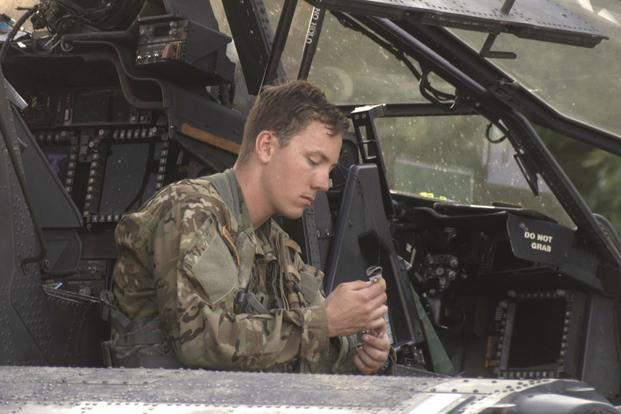The head of the Army aviation today said that the service is about six years away from reversing its shortage of pilots for the AH-64 Apache and other rotary-wing aircraft.
"We are short pilots ... we are under our authorization for aviators, most predominantly seen in the AH-64 community," Maj. Gen. William Gayler, commanding general of the Army's Aviation Center of Excellence and Fort Rucker, Alabama, told an audience at the Association of the United States Army's Sept. 5 Aviation Hot Topic event.
"We under-accessed, based on financial limitations, to bring in the number of aviators that we were required to meet an operational requirement from Forces Command."
Between 2008 and 2016, the Army fell short in accessions of aviators, creating a shortage of 731 slots, Gayler told Military.com.
Since then, the service has reduced the shortage to about 400 through increased accessions of new aviators and paying retention bonuses of up to $35,000 each to seasoned pilots, Gayler said, adding that he didn't have an exact number of the number of Apache pilots the Army is short.
"You can't fill the void with just accessions because, then six to eight years later, you will have a relatively inexperienced force," Gayler said.
In the next 18 months, 33 percent of the active-component warrant officer aviation population will be retirement-eligible at a time when the airline industry has a huge pilot shortage as well, he said.
"They are highly recruiting all services ... and we have lost some Army rotary-wing aviators to them," Gayler said.
As an incentive, the Army has given out about 341 retention bonuses to pilots since late 2015 that were worth up to $35,000 each, Gayler said. He added that the biggest bonuses went to Apache pilots, but would not say how many received them.
"We did it in two different year groups; we did mid-grade and we did seniors with 19 to 22 years in service," Gayler said. "And some people questioned, 'hey why would we give a 20-year Army aviator a three-year bonus,' and my answer is, 'because if they all retire, we have no experience in our fleet.'
"We retained quite a few mid- and senior-grade [aviators] that will enable us to get out of this experience gap, but we still have to bring in more aviators."
The plan now is to access 1,300 aviators a year, "which over the next five to six years will completely fill us up," Gayler said. "It took us a decade to get into this position; we can't get out of it in a year or by next Thursday, so we've got some work ahead of us."
-- Matthew Cox can be reached at matthew.cox@military.com.









